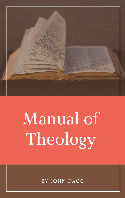In this class, we will look at getting source material for module creation. Getting Source Material is a help blog article for theWord community on how and what and where to get material to go into theWord format for your Bible Study.

Dagg Manual of Theology is a theology work in 2 volumes by J.L. Dagg a Reformed Southern Baptist. It is an extensive, very ample presentation of doctrines.
This is an extensive Bible Systematic Theology (Bible Doctrines book) from a conservative point of view.
Read/Download: now with pdf download link. 50,000 views on this page with download link
The Best Source Material: Your own Creations
The absolutely best resources for making modules is your own works, your own writings. Note that you automatically have the copyright for anything you write.
In my seminary homiletics class, somebody asked about using Commentaries in our sermons we create as pastors. The answer the professor gave was interesting and informative.
There is nothing new under the sun. — Dr. Steward Custer
This is never truer than when you are talking about books and commentaries. Anything that is truly new and unique is most probably heresy. So there is no trophy for getting something that is unique and not found in the Bible or literature on the Bible.
Everybody writes about the Bible, and topics in the Bible and these writings are not newly copyrighted. The rule of thumb is that if you can find the same quote in three different references (different authors), and they are not directly quoting a single author, then it can be considered common knowledge, and no footnote is required. Courtesy would suggest that one is given if you know who originally came up with the quote.
If you rephrase a concept, then that rephrasing does not need to be footnoted.
Even if you do directly quote somebody word-for-word, you do not need to get “permission” for this until it is a substantial amount of his work. Taking quotes out of somebody’s copyrighted work for criticism or commentary is perfectly legal under the copyright laws. Just don’t quote the major bulk of somebody’s work because that is not allowed. Another thing that is unethical is to use somebody’s exact words without giving them credit for those words. If the words are generally common knowledge, then that is okay. “A sower went out to sow the seed” is from the Bible’s parable of the sower, and it is not necessary for you to footnote it.
If you are a preacher and preach sermons every week, or teach Sunday School lessons, you most probably are already writing down your notes in a word processor, and to copy and paste them over into a theWord module is really little work, and your work can be recorded and left for Christianity.
The Best Source Material: Public Domain Works
Public domain works are another source of good material for creating modules. I would caution that having said this, this area has some difficulties in it.
First of all, you must understand the copyright laws to decide if something is in public domain or not. These laws vary from country to country, and there are unilateral treaties where some nations go together to honor each other’s copyright laws. I will not get into this issue here because it is difficult enough and deserves a fuller treatment than what I have time for here. But there are some guidelines I will give.
If the author is living, you can pretty much be there is a copyright on the work, and unless that author specifically gives permission for distribution, you should stay away from it. (If you are the author, then you can give that permission.)
Under copyright laws, if something is unclear if it is under copyright or not, and you make a module and post it for distribution, then the procedure is that the copyright owner has to ask you to remove it, and if you don’t, then they can sue you. The condition is that they have to show a financial loss, and so they should be selling the same material somewhere commercially, in paper form, or somehow. So again, if it is being sold somewhere, beware.
Generally, if you are not profited (charging or making money from your distribution of it) then a copyright court will order you to cease and desist.
Does it already exist?
Another consideration on public domain works is whether there is a module already out there, so why would you waste time on doing it again? There is no general registry of theWord modules that have every single module out there in the list. I regularly search the internet for theWord modules. Since most people who post theWord modules do not put anything distinctive to catch their pages and sites in these kinds of searches, we are not going to generally know. I would suggest adding something like #thewordmodules on pages to help others in finding these modules.
I have made a Google Custom Search Engine for searching for anything on any of my theWord websites. Note that these results have Google ads in them, and they may pick up web pages with some mention of your search word, but necessarily a module to download. It is better than just using Google though.
Just David Cox Websites – Google Custom Search
Google.com/cse – Just David Cox websites (for theWord)
All theWord Module Websites – Google Custom Search
I also have made a Google Custom Search Engine for all the websites I come across that have theWord modules.
Google.com/cse – All theWord Websites (for theWord)
Note that these Custom Google Search engines are set up with about 30 websites, but they don’t seem to pick up stuff on the rest. Use regular Google instead, because it is better although there are a lot of non-positive resutls you have to weed through.
Get this series of posts in PDF format
See more Module Creation Posts
- Converting from other Module Formats
- Converting an Image PDF to theWord Format
- Commentary Module Creation
- Bible Reading Plans
- 07 Module Creation Upper Case to Lower Case
- 06 Touch Typing Help for Module Creation #1
- 05 Getting Source Material
05 Getting Source Material

